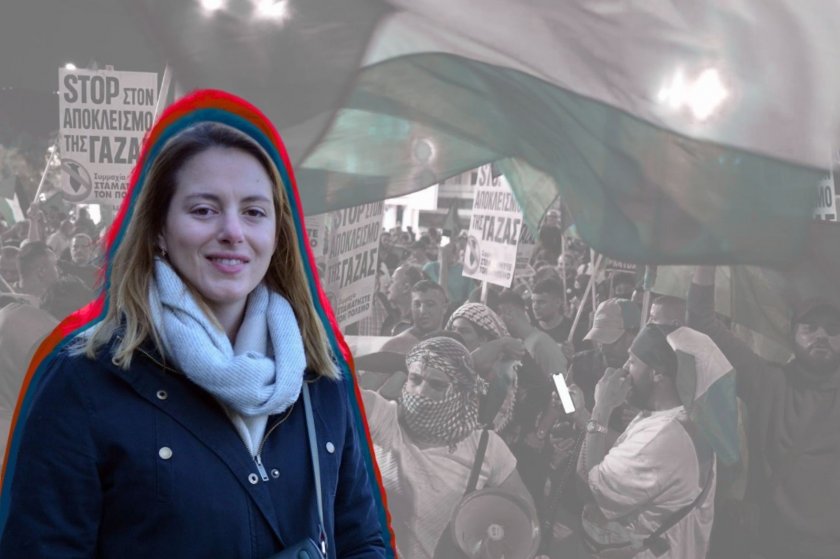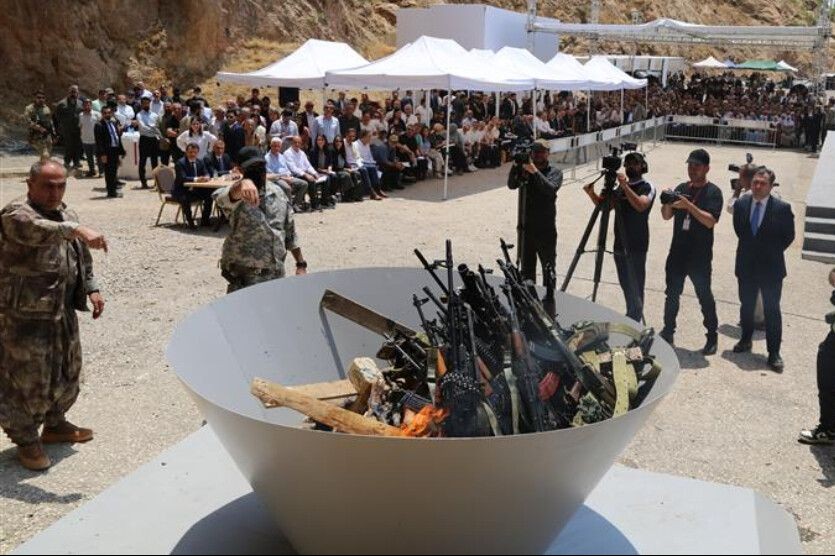Bahçeli's statements, the attack on TUSAŞ and Öcalan's message

Yusuf Karadaş

Fotoğraf: DHA
TUSAŞ (Turkish Aerospace Industries Inc.) was attacked after Devlet Bahçeli, a partner of the government, called for the isolation of PKK leader Abdullah Öcalan to be lifted and for Öcalan to "declare the laying down of arms by speaking to the DEM party's parliamentary group". The fact that one of the most important institutions of the Turkish military-industrial complex was targeted and the timing of the attack, regardless of who was behind it, shows that this attack was a reaction to the process that was supposed to be started by Bahçeli. Another important development that took place on the same day as this attack was that PKK leader Ocalan, who was last allowed to meet his family in 2020 and has been in isolation for 43 months, was allowed to meet with his nephew Omer Ocalan, an MP.
It is clear that it is inconceivable that MHP leader Bahçeli, who said that his handshake with the DEM members was "not improvised", would make such an important statement as Öcalan speaking in parliament and benefiting from the "right to hope" without a certain consensus between the state and the forces representing the government.
The first point to note here is that this time the state has decided to continue the process not through the AKP and Erdoğan, but through Bahçeli, the leader of the MHP, whose relations with institutions such as the Special Warfare Department, which constitute the "steel core of the state", are known. We can say that behind this decision is both the mistrust of the Kurdish people towards the AKP-Erdoğan because of the overturning of the table in the "solution process" between 2013-15 and the calculation that the continuation of this process by the most nationalist party of the ruling bloc would be more useful in terms of consolidating the "internal front".
Secondly, Bahçeli's acknowledgement of the isolation imposed on Öcalan and his subsequent call for Öcalan to make a speech to the DEM party's parliamentary group and to benefit from the 'right of hope' that would ensure his release, which goes beyond the 'solution process', not only shows that the state is stuck, but also that the state wants to take quick steps in the face of this situation.
Here, the question of what developments have put the state and the government under such pressure and forced them to take quick steps gains importance.
In order to answer this question, it will be instructive to look back at the conditions under which Özal and Erdoğan put the 'solution' of the Kurdish question on the agenda.
In the beginning of the 1990s, Özal had said 'we can discuss the federation' in the context of the solution of the Kurdish question. However, when Özal made this statement, he did not have in mind to give rights to the Kurds, but to swallow the Iraqi Kurdistan region, which was de facto separated from Iraq at that time, and to have the energy resources that adorned the dreams of the Turkish bourgeoisie. This policy, which Özal described as "putting in one and getting three", was based on the calculation of turning the regional developments brought about by the Gulf War (the US intervention in Iraq in 1990-91) into an opportunity for the interests of the Turkish bourgeoisie.
The 'solution process' that Erdoğan pursued between 2013 and 2015 was also linked to regional developments and the calculation of eliminating the possible risks of these developments and supporting the Kurds in their quest for regional leadership. Of course, this calculation was accompanied by the goal of establishing a presidential regime for 'strong leadership' at home in connection with regional ambitions. After the Erdoğan government took the lead in the policy of intervention in Syria, the Kurdish autonomous administration in Rojava emerged as an unexpected result. Therefore, Erdoğan had to knock on İmralı's door in order to eliminate the possible risks of the Kurdish Autonomous Administration in Rojava, to overthrow the Syrian regime together with the jihadists and to establish a presidential regime at home.
Therefore, when the state is under a serious regional risk/threat or when it sees new opportunities for the regional interests of the Turkish monopoly bourgeoisie, it remembers the Kurdish question, which is one of the important problems of Turkey and the region.
Bahçeli himself says that the steps he has taken today, starting with the handshake with the DEM party members, are related to "entering a new era in the region" (the emerging risks and opportunities).
Israel, with the support of the USA and the Western imperialists, is inflicting serious blows on the forces within the "Axis of Resistance" by spreading the attack and occupation it started from Gaza to Lebanon and Syria. The serious weakening of Hamas and Hezbollah, the two important links of the Axis of Resistance, with successive blows, the reluctance of Syria, where the destruction and devastation caused by the war continues, to get involved in this process, Russia's preoccupation with the impasse in Ukraine and China's distant stance encourage the forces led by Israel and the USA to target Iran directly. Targeting Iran stands out as the most critical move for the US and Israel in terms of eliminating the biggest 'threat' in the region and reshaping the region on the basis of their own interests. Such a move would undoubtedly have very important consequences for the entire region, and there is no doubt that during US President Biden's meeting with German Chancellor Scholz, French President Emmanuel Macron and British Prime Minister Keir Starmer in Germany last week, the possible intervention in Iran was discussed in addition to the Ukraine problem.
It seems that the Erdogan government in Turkey has been forced to make a new move on the Kurdish question, which is its weak underbelly, in order to both get rid of the possible risks of such developments and to make use of the opportunities that these developments might create. Rojava (Kobanê), one of the issues that played a decisive role in the termination of the solution process, is one of the main risks for the Turkish rulers today. In addition to this risk, there is also the PKK's ongoing relationship and cooperation with the YNK and the Iranian-backed Hashd al-Shaabi in Iraq to a certain extent. Therefore, the Kurdish issue is the weak belly of the government both in terms of the US-Israel forcing Turkey to take a more open stance on their axis against Iran in connection with a possible war and intervention, and in terms of Iran's response to a possible threat and attack from Turkey.
Regardless of who carried out the TUSAŞ attack, it is necessary to read the attack together with these developments. This action may have been carried out by the PKK in order to show that the PKK's ability to carry out actions in Turkey, even against the most critical organisations, still exists, or it may have been a continuation of the clique struggle within the state, or it may have been a message given by other regional actors. Ultimately, however, this action shows us that the policies of the current government have made Turkey vulnerable to intervention and that concrete steps need to be taken to solve the Kurdish problem.
After the attack on TUSAŞ, Bahçeli said 'No bloody and treacherous project will be able to stand against our national unity and brotherhood', signalling that the policy he was the spokesperson for would continue despite the attack.
Before that, secret talks were held between the state and the PKK while the PKK's actions and state operations continued. Therefore, the TUSAŞ attack and the following state operations against the PKK and SDF in Iraq and Syria can be read in this way.
On the day of the TUSAŞ attack, Ömer Öcalan, the nephew of Ömer Öcalan, who is also a DEM deputy, had a meeting with Abdullah Öcalan, who has been held in isolation in İmralı for a long time. It should be noted that the isolation of Öcalan since he was captured in an international operation in 1999 and brought to Turkey has only been lifted when the state or the government needed his messages.
Ocalan, whose reaction to Bahceli's 'enthusiastic' statements is still under review, said in a short message: 'The isolation continues. I have the theoretical and practical power to move this process from the grounds of conflict and violence to the legal and political grounds if the conditions are right. In this message, Öcalan shows that he has the will for a solution, but that he is approaching the process cautiously. Ocalan's message is in line with the reactions of PKK leaders such as Murat Karayılan and Cemil Bayık to Bahçeli's messages. Öcalan's emphasis on "legal and political grounds" is important in order to establish the legal basis of the process and to include the CHP, which has said that "the place for a solution is the parliament".
There is no doubt that the Erdoğan government wants to use the new process, in which Bahçeli is the spokesperson, to protect the regional interests of the monopoly bourgeois reaction, with which it is in a fateful alliance, and to strengthen its own bases in the new constitutional process. However, beyond the calculations of the ruling bloc, the outcome of this process will be determined by the relationship of forces, which will be formed according to the attitude of the forces of labour and democracy in the country. The attitude of the forces of labour, peace and democracy towards the government, which talks about securing internal peace against the threat of regional war, should be to fight for the steps to be taken in accordance with these statements and in the interest of the peoples living in the country. Because without ending the occupation in Syria and Iraq, the cooperation with the jihadists and the expansionist war policy in the region, neither Turkey can be kept away from regional threats, nor can internal peace be achieved without taking the necessary steps for the democratic solution of the Kurdish question on the basis of equal rights and the democratisation of the country.
Forwarding to the next article...
10 seconds remaining





Follow Evrensel